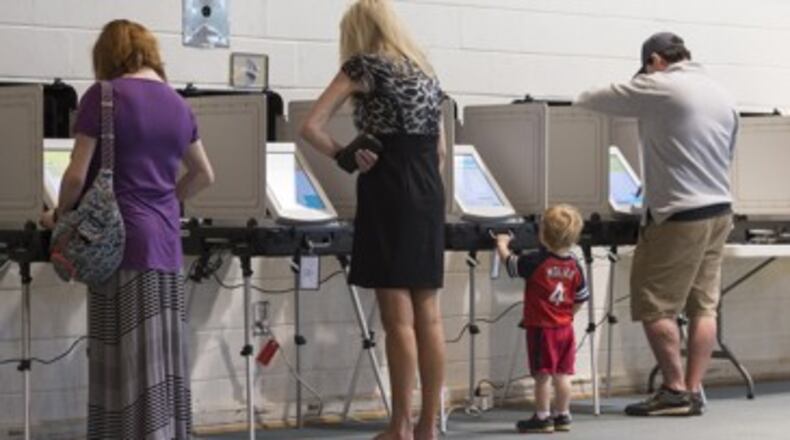The Georgia secretary of state’s office announced Thursday that it would reinstate about 22,000 voters that it had removed from the rolls earlier this week.
The announcement came two hours before state attorneys returned to federal court to defend the cancellation of more than 300,000 voter registrations Monday night.
Those reinstated to “inactive” voting status will have until the next state-scheduled update to the voter list in 2021 to contact election officials or vote to become “active.”
Josh Belinfante, an attorney representing Secretary of State Brad Raffensperger, told U.S. District Judge Steve Jones that the office chose to re-evaluate when a voter’s inactivity started after receiving documents from a voting rights organization that is suing the state.
Jones is considering whether to restore the registrations of about 120,000 infrequent voters who were removed from the state’s voting rolls Monday night.
Attorneys for Fair Fight Action called the reinstatement a victory.
“There were 22,000 that were reinstated to the voting rolls just by us challenging them,” Fair Fight attorney Paul Smith said.
Fair Fight asked Jones to review whether a new state law gives voters a longer amount of time before their registrations are canceled. The cancellations Monday targeted people who haven’t cast a ballot since 2012, as well as others who appeared to have died or filed change-of-address forms. Fair Fight is arguing that registrations should only be canceled if they’ve been inactive since 2012.
A press release from the secretary of state’s office said those 22,000 voters removed from the rolls on Monday had been inactive since June 2012, but Belinfante said the office now is interpreting the state law to begin counting inactivity in January 2012.
“The 22,000 records that are being moved back into inactive status are people who last had contact with the voter registration system between January and May 2012,” the secretary of state’s office said in the press release.
Jones allowed the secretary of state’s office to cancel voter registrations Monday, but he initially said in court that he could reinstate them. Attorneys for the secretary of state’s office said canceled registrations could be restored within 48 hours if Jones orders them to do so.
But on Thursday, Jones said he did not have the authority to tell a state it is interpreting a state law incorrectly and therefore he could not force the state to reinstate the voters.
Attorneys for Fair Fight said they were asking Jones to determine whether removing the voters violated the Constitution.
“There is nothing wrong with a federal court reading state law and interpreting it,” Smith said.
In all, almost 309,000 Georgia voter registrations were canceled Monday night.
The cancellations included the 120,000 who were declared “inactive” after three years in which they failed to participate in elections, contact election officials, respond to election officials’ mail or update their registrations. Then their registrations were voided after they missed the next two general elections.
A change in state law this year lengthens the period before voters become “inactive” from three years to five years. If the new law applies to voters who had previously been declared “inactive,” their registrations could be restored.
Fair Fight attorneys argued that the new state law should follow a continuous timeline that would keep voters on the rolls until they have been inactive for nine years.
But state attorneys said before the law that was passed earlier this year, voters were moved from the “official list of electors” to the “inactive list of electors” after three years of no contact with an election office. Once on that list, they had four years to become “active” before their registration was canceled.
“We’re talking about voters who are already on the inactive voter list,” Belinfante said. “The plaintiffs look at it as a status. The state is arguing that it’s an actual list. The lists are distinct, and the lists matter.”
The secretary of state’s office, which helped write the new law, said the measure wasn’t intended to retroactively cover inactive voters.
“If the General Assembly wanted to change the list of inactive voters, it could have done so,” Belinfante said.
About 70,000 voter registrations could be restored if Jones rules the law retroactively protects voters. About 50,000 registrations would still be canceled because they’ve been inactive for more than nine years, an attorney for the state, Bryan Tyson, said in court Monday.
There is some pressure on Jones to at least make a partial decision soon.
Fair Fight attorneys argued that there were at least 532 voters removed from the rolls during Monday’s list maintenance that are in state House District 171, which has a special election scheduled for Jan. 28. It’s unknown how many, if any, of those voters were reinstated Thursday.
“They’re going to need to know something by December 30,” Jones said.
Keep Reading
The Latest
Featured





